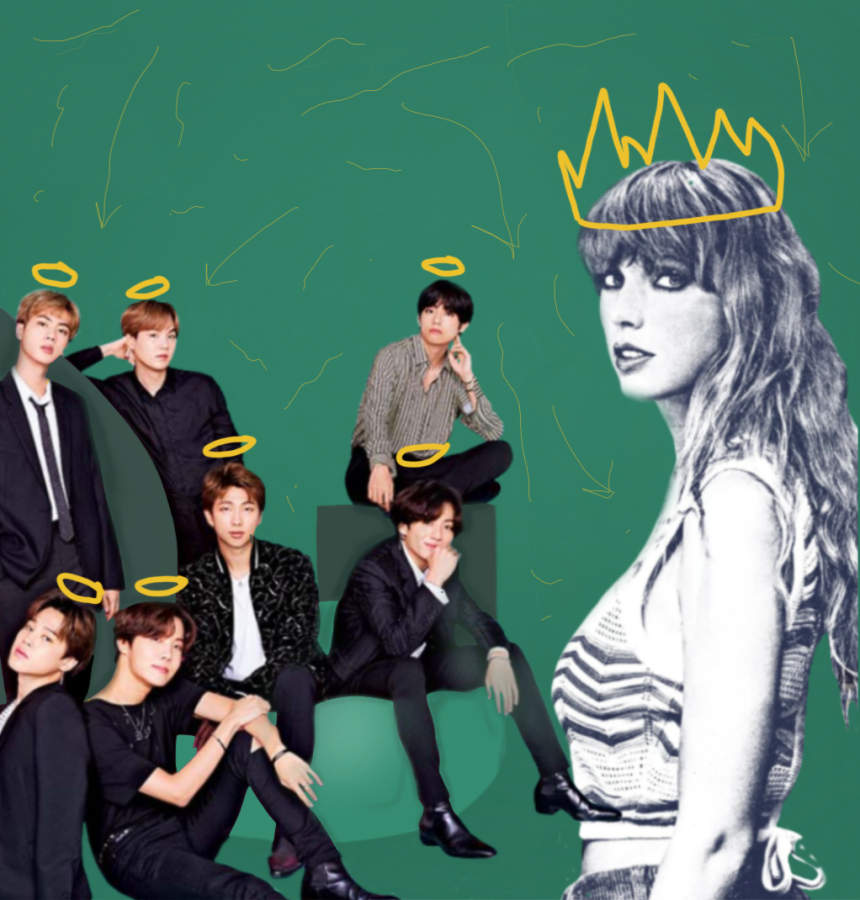A Deep Dive Into Fandom Culture
April 3, 2023
From Frank Sinatra to BTS, fandoms have been around for way longer than we give them credit for. Whether you were sitting in your room sobbing over a new Beatles’ album or are currently revolting against Ticketmaster for Taylor Swift tickets, stan culture has evolved into a sort of unified people serving one popular cause: a famous person (or people) who does not know they exist. But where is the line between admiration and obsession?
Urban Dictionary defines a fandom as “a group, or community, of people who like a game, book, or specific topic.” One of the most popular of these specific topics is music artists: Taylor Swift, Harry Styles, Lana Del Rey, Beyonce, Rihanna, Drake, and Justin Timberlake could be a few that come to mind. VeryWellMind explains, “Fandom starts with the adoption of a fan identity. Becoming a fan can be a powerful way to define the self, and when a fan acts on their fandom, they are expressing an identity they have chosen for themselves.” There is nothing wrong with being a part of a fandom, as I consider myself to be a part of a few (do not even get me started on my favorite books or music artists). However, it is when the enjoyment of content crosses the line between enthusiasm and concerning infatuation that fandom participation can become toxic. One of the most notoriously toxic fandoms is the BTS fandom, also known as the ARMY. Senior Madison Nakano says that, in BTS’ case, “there are some fans who are way too obsessed and are basically stalkers.” There is a Korean word for these stalker-like fans: a “sasaeng.” Sasaengs are defined as “obsessive fan[s] who stalk or engage in other behavior constituting an invasion of the privacy of Korean idols, drama actors or other public figures.” Unfortunately, these types of fans are horrifyingly common. Whether they find idols in their hotel rooms or while they are trying to enjoy an individual workout, sasaengs are scarily talented at invading Korean stars’ personal space. But, this behavior is not unique to K-pop or other Korean media. In Western music’s case, sophomore Samantha Betts comments on how “Harry Styles is much more private about where he is and what he is doing. People just manage to find him.” This dismal truth is one that we must acknowledge. There is a difference between admiring an artist’s creation and being outrageously disrespectful to the person’s privacy just because of your desire to get close to them. It is crucial to remember that being in a fandom does not mean you are a celebrity’s friend. While belonging to a fandom is an easy way to establish a community for oneself, it is not an excuse to band together and invade a celebrity’s life.
Consequently, obsessive behaviors can turn into entirely toxic fandoms. But what makes a fandom toxic? ReelRundown says that there are three components to the creation of a toxic fandom: “possessiveness, entitlement, and a feeling of superiority.” Not wanting to let anyone else enjoy the same content, believing that they have the right to ask for certain things to happen (music releases, events in shows, etc.), and feeling better than others due to having been a fan longer are some examples of these behaviors. In one aspect, junior Asher Liddle explains that sometimes, Taylor Swift fans (“Swifties”) sometimes behave “like a hive mind… there are tons of [fans], so it can be kind of scary.” In a similar vein, freshman Laila Motiwalla says of the One Direction fandom: “[The fandom’s] devotion [to the band] caused them to become popular worldwide, but this also caused stalking, rumors, unnecessary hate towards other celebrities.” Motiwalla brings up an important aspect of fandom participation; obviously, the bigger the fandom, the more influential the celebrity or content. As a result, the bigger the celebrity, the more likely it is for the fandom to become overly protective. There is a fine line within this as long as rationale is maintained. As previously mentioned, there is often a disconnect between remembering that a fan is just a fan, not a close friend of a celebrity. Liddle expands on this, saying, “Sometimes people develop a weird relationship with who they are a fan of and think they know them personally,” with junior Bianca Cataniag similarly mentioning, “Fans are just people who know of a person, not people who know celebrities personally.” The lack of acknowledgment to this fact is a crucial aspect as to why fandom has become such a taboo idea. We must keep in mind that we do not know who we admire. As much as I would love to personally know Andrew Garfield, I do not, and therefore, I am just his fan. I do not know how he acts when the cameras are off, and I never will. While we would all love to believe that we know our heroes and can safely say that we know they are the most perfect people in the world, we do not, and we cannot ever know that for certain. Therefore, rational thinking is essential to restrain yourself from putting whoever you are a fan of on an unfair and unrealistic pedestal.
Due to the growth in the number of fans that are obsessed and oftentimes found defending the celebrity to the death on Twitter, general speculations of fandoms are typically negative. Toxicity in fandoms comes not only from the individual, but also from general perceptions. While these assumptions are not always bad, they are still generalizations, which are unfair regardless. In senior Kunal Ballapragada’s case, who likes Star Wars, he says that the fandom is known for “keeping track of the fandom more than they should.” Sophomore Matthew Fischer also likes Star Wars and has similar opinions: “Some of the people can go way over the top with Star Wars memorabilia and with sharing their views on the Star Wars lineage.” However, Nakano has a more optimistic perspective on the BTS fandom, expressing, “A lot of people outside the fandom think we are crazy and obsessed. But I think once you join the fandom, you understand where we are coming from.” There is certainly much validity in the way fandoms behave. BTS gives back often and influences their fans in the best ways they can. Cataniag says that the people she interacts with within her fandoms “do not let it control their personality” and are therefore enjoyable. Most of the time, toxicity in fans does not spark from the celebrity themself.
Overall, stan and fandom culture holds both value and concern. Freshman Matthew Finnigan believes that “[stan culture] has negative effects. It is good that people have things that they are passionate about and really like, but a lot of the time these obsessions end up having negative impacts on both the celebrities and other people who enjoy that thing.” Liddle says that it is “cool when a big group of people are all passionate about one thing, but with anything, sometimes it goes too far.” No matter your own personal convictions, opinions, or fandoms you belong to, as long as you remain levelheaded and avoid following any signs of toxicity within the fandom, there is nothing inherently wrong with admiring a celebrity. In the meantime, I will still be passionately discussing the reasons as to why all three Spider Men are fantastic in their own ways, blasting SEVENTEEN a little too loudly in my headphones, and spam texting my friends when I read an amazing quote in my current read.




